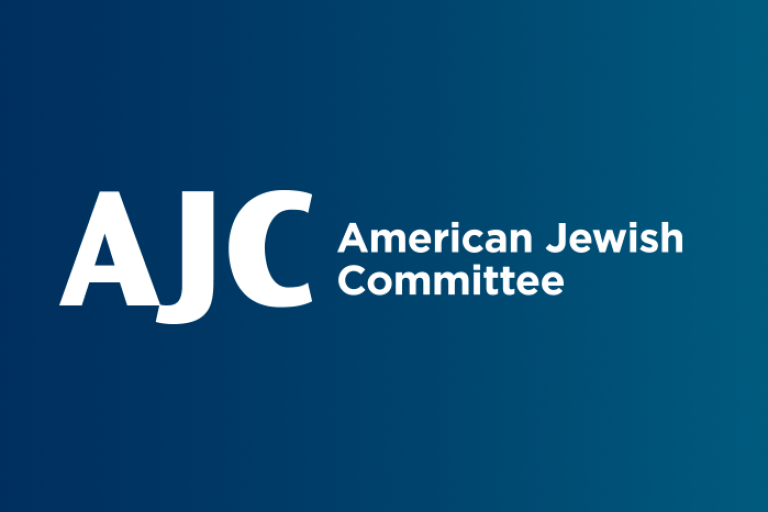December 28, 2016 — New York, New York
AJC attended today’s Washington address by Secretary of State John Kerry on the pursuit of Israeli-Palestinian peace, and issued the following statement:
AJC appreciates the Obama Administration's dedication to assuring Israel’s security against a range of threats and its fair treatment in international forums, as Secretary Kerry cited in his detailed address today. Although we have differed with Administration policy toward the Middle East in several areas, we have applauded its consistent political, military, intelligence, and financial commitment to the U.S.-Israel alliance, and to the achievement of peace for our democratic ally in a tumultuous region.
This commitment continues in the longstanding, bipartisan tradition of U.S. support for Israel’s security and well-being. We look forward to continuing that tradition, which is profoundly in the mutual interest of both our countries, in the Trump Administration.
"We deeply appreciate Secretary Kerry's good-faith efforts and longstanding, steadfast commitment to Israel. At the same time, we respectfully believe that recent developments may lead us further away from the shared goal of resuming direct, face-to-face Israeli-Palestinian talks, leading to a lasting two-state accord. As long as the Palestinian leadership believes it can internationalize the conflict, it will have little incentive to return to the table, from which it's been AWOL for years, and engage in the tough, direct bargaining that is the essence of any such negotiation," said AJC CEO David Harris.
Secretary Kerry defended the Obama Administration against criticism about its motives and methods in allowing a resolution that condemned Israeli settlement policy to be adopted December 23 by the UN Security Council. While we reject hyperbolic assertions that President Obama and Secretary Kerry are anti-Israel, we continue to believe that Resolution 2334 was unbalanced and merited a U.S. veto, and that the UN – which has declined to take serious action on far more deadly and destabilizing conflicts – has once again proven itself incapable of rendering fair judgment of Israel.
Secretary Kerry appropriately called out Palestinian terrorism and incitement to violence – in language far more explicit than in the mild incitement passage of UNSCR 2334 – as undermining prospects for a two-state solution to the Israeli-Palestinian conflict. It is impossible to overstate the toxic effect of incitement – and the celebration of terrorist "martyrs" by Palestinian leaders – on an Israeli public that would, in effect, be asked to trust that same leadership with essential elements of Israel’s security in a two-state arrangement.
In his list of "principles" that he said must underlie a two-state resolution of the Israeli-Palestinian conflict, Secretary Kerry cited the final-status issue of Palestinian refugees. Disturbingly neglected in his address – and in many discussions over the years on this historic conflict – was the issue of justice for Jewish refugees from Arab lands, whose number approximates that of Palestinian refugees.
Secretary Kerry painted a dire picture of a "one-state reality" that he saw as the logical outcome of continued settlement construction in the West Bank – particularly in areas east of the security barrier. While the Secretary rightly stated that Israeli settlements are not the only, or even the core, reason for the Israeli-Palestinian conflict, he focused much of his attention on the obstacles posed by extensive construction to the creation of a contiguous, viable Palestinian state. Apropos, he skirted the issue of whether that state would somehow include Hamas-run Gaza, not to mention the challenge of geographical contiguity between the West Bank and Gaza.
We want to be certain that Palestinians, moderate Arab states, and the international community do not come away from the UNSC abstention or Secretary Kerry’s speech with the wrong message about settlements. AJC agrees – and its Board of Governors resolved in a statement earlier this month – that a one-state formula is untenable, and that settlement expansion east of the security barrier is inconsistent with the pursuit of a two-state solution. We also firmly agree that settlements are not the core issue. Continued Palestinian resistance to the acceptance of Israel’s legitimacy and the necessity of territorial compromise is.
Secretary Kerry made it plain – in the "principles" he set forth and throughout his address – that a solution to the Israeli-Palestinian conflict cannot be imposed by outside forces, but must be resolved by the parties themselves in direct negotiations. We wholeheartedly agree.


